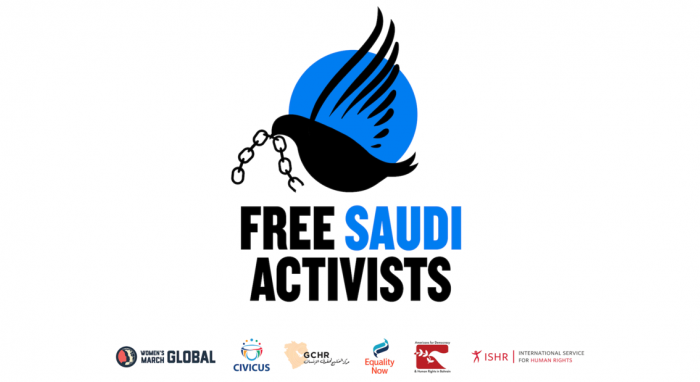Our organisations remain highly concerned about the continued arbitrary detention of women’s rights defenders including Loujain Al-Hathloul, Nassima al-Saddah, Samar Badawi, Nouf Abdelaziz, and Miyaa al-Zahrani since 2018. Several of them were subjected to torture, sexual violence and other ill-treatment, with no access to effective remedy.
Our concerns are shared widely and consistently by the international community. The UN High Commissioner for Human Rights has repeatedly called for the release of women’s rights defenders since their arrest in mid-2018.[1] At the UN Human Rights Council, over 40 States from across the world have repeatedly called on the Kingdom of Saudi Arabia to immediately release all those detained for exercising their fundamental rights and in particular women’s rights defenders.[2]
The Committee on the elimination of all forms of discrimination against women (CEDAW) has repeatedly engaged with the Saudi authorities, urged the release of Al-Hathloul and all women human rights defenders, and expressed their serious concern over Al-Hathloul’s detention conditions. Al-Hathloul is on hunger strike to protest denial of her right to regular contact with her family. The UN Secretary General also raised the cases of Al-Hathloul and Badawi’s detention in his annual reports on cooperation with the UN.[3]
UN Special Procedures have repeatedly urged the Kingdom to release the activists through various communications and press releases.[4] While welcoming some reforms of the male guardianship system, they stressed that “these positive developments are the result of years of relentless advocacy and effort of many human rights and women’s rights defenders in Saudi Arabia. Many are still being held and we call for their immediate release.”
During Saudi Arabia’s Universal Periodic Review (UPR) in November 2018, Saudi Arabia received at least 22 recommendations calling for the release of human rights defenders, including women human rights defenders, from detention, and to guarantee a safe and enabling environment to do their work.
The Saudi Human Rights Commission stated in its March 2020 report that “the Kingdom of Saudi Arabia has been making steady progress in terms of consecutive reforms and reviews of laws and regulations towards the empowerment and enablement of women”. The immediate and unconditional release of all women’s rights defenders would be a litmus test of the Saudi government’s political will to improve the human rights situation.
Media reports by Saudi officials of “clemency” for the women’s rights defenders suggest that they have committed crimes, however we reiterate that they are arbitrarily detained because of their peaceful activism. The Saudi authorities must immediately and unconditionally release all women’s rights defenders, drop the charges against them, and stop all harassment, intimidation and travel bans against their family members.
Sincerely,
- ACAT-France
- ALQST for Human Rights
- Americans for Democracy & Human Rights in Bahrain
- Amnesty International
- Bahrain Institute for Rights and Democracy (BIRD)
- CIVICUS
- Coalition Tunisienne Contre la Peine de Mort
- CODEPINK
- DefendDefenders (East and Horn of Africa Human Rights Defenders Project)
- Democracy for the Arab World Now (DAWN)
- English PEN
- Equality Now
- European Saudi Organisation for Human Rights
- FIDH, in the framework of the Observatory for the Protection of Human Rights Defenders
- Freedom Initiative
- Gulf Centre for Human Rights
- Human Rights Watch
- Humanists International
- International Service for Human Rights (ISHR)
- MENA Rights Group
- Nachaz Dissonances
- No Peace Without Justice
- Organisation against Torture in Tunisia
- PEN International
- Project on Middle East Democracy (POMED)
- Renewal Forum for Citizenship and Progressive Thought- Tunisia
- Saudi American Justice Project
- Scholars at Risk
- The B Team
- The Lebanese Council to Resist Violence Against Woman (LECORVAW)
- The Tunisian League for Human Rights Defence
- Urgent Action Fund for Women’s Human Rights
- Vigilance for Democracy and the Civic State
- Women’s March Global
- World Organisation Against Torture (OMCT), in the framework of the Observatory for the Protection of Human Rights Defenders
Photo: Free Saudi Activists Coalition




